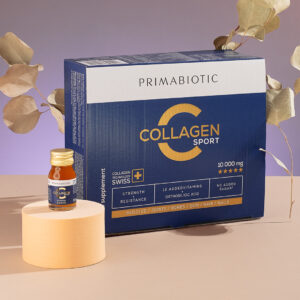Why? Because they are absorbed the best, are quickly taken up by the body, and contain an effective amount of collagen to make a difference. In this article, you’ll find out which supplement form is worth choosing, which additional ingredients are truly necessary, and what the research says.
What Are the Effects of Collagen Supplementation?
Collagen supplementation is becoming increasingly popular among people who care about radiant skin, strong nails, thick hair, and flexible joints. Collagen is one of the key structural proteins in the human body – responsible for skin elasticity, joint resilience, and tissue strength. Its natural production decreases with age, prompting many to turn to supplements.
What effects can collagen supplementation have?
It’s worth mentioning the results of studies conducted on Primabiotic Collagen. The 90-day study involved a group of 20 people aged 30 to 66 and was carried out in an independent research laboratory. What does collagen supplementation do? The results showed improved skin elasticity, better hydration, and reduced wrinkle visibility. Additionally, collagen supplementation improves the appearance of nails, reduces cellulite, and increases hair thickness. This demonstrates that regular collagen supplementation can support the body’s natural regenerative processes.
Collagen combined with vitamin C supports the body’s endogenous collagen synthesis. Furthermore, the presence of vitamin D in a collagen supplement contributes to maintaining healthy bones and muscle function, while biotin helps keep hair and skin in good condition. Therefore, collagen supplementation should ideally include vitamin C, vitamin D, and other complementary ingredients to achieve the best results.
How to Choose the Best Form of Collagen for Your Needs
When deciding which collagen to choose, it’s important to consider not only the supplement form but also its composition, source, and quality. A high-quality product should contain:
- Bovine collagen – more stable, resistant to heat, and suitable for those allergic to fish,
- Collagen peptides – the most absorbable form of collagen,
- At least 10,000 mg of collagen per day,
- Vitamin C – supports natural collagen synthesis,
- A clean formula: free from preservatives, sugar, and unnecessary additives.
More and more experts point out that collagen peptides – tiny broken-down molecules easily and rapidly absorbed by the body – are the best choice. Choosing collagen free from preservatives and sugar reduces the risk of consuming unwanted substances and supports a natural, beautiful appearance.
What Forms of Collagen Supplements Are Available?
The market offers many collagen supplement forms – tablets, powders, capsules, and liquids. Each has pros and cons, but not all are equally effective. If you’re wondering which collagen to choose to actually see results, the following overview will help you make an informed decision and pick the best collagen.
Liquid Collagen
Liquid collagen containing collagen peptides is considered the most effective. This form is highly absorbable and rapidly taken up by the body. Thanks to its liquid consistency, the body doesn’t need to break down coatings or tablets – the ingredients go straight to the digestive system. Additionally, the amount of collagen in a single liquid dose is usually higher, allowing you to meet the daily recommendation of 10,000 mg without taking many capsules. It’s convenient, modern, and the most efficient option.
Collagen Tablets
Collagen tablets are convenient to carry but less effective than liquid form. They usually contain smaller amounts of collagen, requiring multiple tablets daily to reach the recommended dose. Moreover, tablets take longer to break down and absorb, which can reduce effectiveness. This form can also be less comfortable for those who have difficulty swallowing pills.
Collagen Powder
Collagen powder offers flexible dosing – it can be added to smoothies, yoghurt, or water. However, its absorbability may be lower than that of liquid collagen peptides. Powder requires daily preparation and doesn’t always dissolve well. If it doesn’t contain vitamin C, its effectiveness may be further limited. This form is also less convenient for travel.
Collagen Capsules
Collagen capsules, like tablets, generally contain small amounts of collagen. To achieve effects, several capsules must be taken daily. Absorption is lower, and the capsule shell can delay uptake. Thus, it’s not the best choice for those seeking quick and noticeable results.
The Most Absorbable Collagen – Which Form to Choose?
If you want effective results, opt for the most absorbable collagen – collagen peptides. This is the most advanced and absorbable form – the body doesn’t have to break it down further, so it reaches target areas faster.
Among the various forms, collagen shots with collagen peptides are regarded as the most recommended option. They stand out for better absorption compared to powders, tablets, or capsules, and for ease of use.
Therefore, if you’re wondering which collagen to choose, go for collagen shots with collagen peptides, free of sugar and preservatives. Preferably of bovine origin – more stable and safer for those allergic to fish. This is the best-absorbed collagen that can truly support your skin, hair, nails, and joints in your daily care routine.
To Summarise: For effective supplementation, choose liquid collagen containing collagen peptides, with a dose of 10,000 mg per day, ideally combined with vitamin C. A proven, clean formula without unnecessary additives is the key to visible results.

